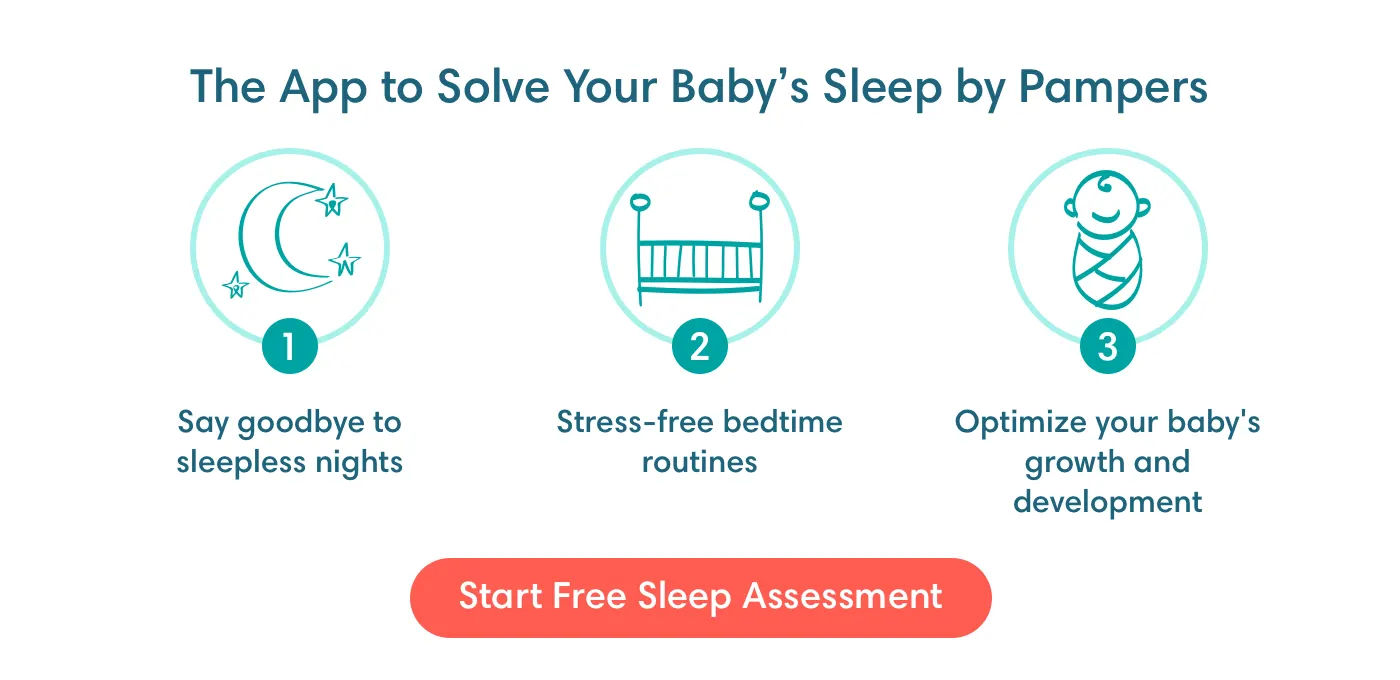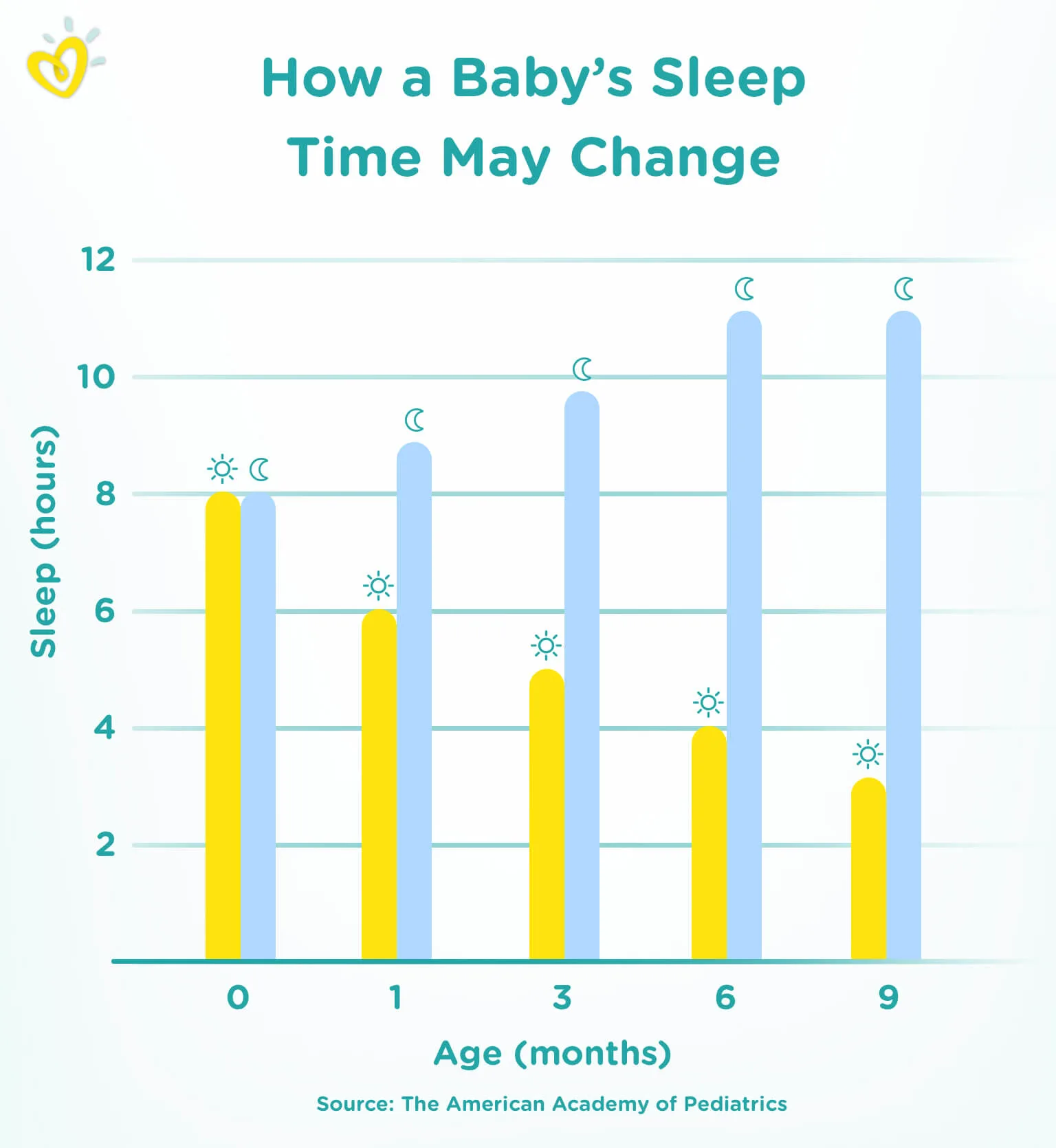When Do Babies Start Sleeping Through the Night?
Along with daytime naps, nighttime sleep is important for your little one’s healthy development. Both new and experienced parents often wonder just how long their baby should be sleeping at night for his age, and when exactly he will be able to sleep right through the night.
You're no doubt looking forward to the stage when your little one can sleep through the night, and we'll provide some tips on how to encourage your little one to do just that. It's important to remember that what “sleeping through the night” means varies from baby to baby, and can even change as your baby gets older.
Read on to learn more about typical sleep patterns for babies, how your baby’s nighttime sleep might vary as he grows, and how you can help your baby sleep better at night.
What Does “Sleeping Through the Night” Mean for Your Baby?
“Sleeping through the night” is actually a misnomer. No one, not even babies, actually sleeps right through the night. There are always periods of wakefulness, and this is normal.
For babies, what parents would typically call “sleeping through the night” is when their baby can sleep long stretches at night, and can even wake in the middle of the night but fall back to sleep without crying out for soothing.
Keep in mind that your baby’s sleep patterns may vary considerably throughout her first year. Getting to the stage where your little one can sleep through the night is not necessarily a linear process.
For example, a baby might be able to sleep for longish blocks with no issues for several weeks or even months, and then revert to waking up in the night and crying out for attention.
What’s Considered “Good” Sleep for Babies?
If a baby can wake up during the night but get himself back to sleep, then experts might say that he is a “good” sleeper. For many but not all babies, this milestone crops up at around 8 or 9 months of age.
It takes time to get to this point, which means you’ll need to be patient in these early months. Your baby has to learn how to self-soothe after waking so that he can fall back asleep without crying out for you.
Even though the ability to self-soothe and fall back asleep could develop at around 8 or 9 months, this might not be the case for your baby. Every baby is unique, and many factors—even things like your child’s genetic makeup and temperament—can affect your little one’s sleep patterns.
Sleep training might be able to help your baby get closer to being able to sleep through the night.
It might reassure you to know that a recent study suggests that it’s normal, and not harmful, if your baby doesn’t sleep through the night by 6 to 12 months of age. In this study, “sleeping through the night” was defined as six to eight hours of sleep without waking up. The researchers determined that babies who wake up more frequently in the night are no more likely to have developmental issues than other babies.
Nighttime Sleep Patterns by Age Group
Your baby's age is a key factor in how long your little one sleeps at night, and whether she can sleep through the night. We’ve described some typical scenarios below, but for more personalized advice it’s best to speak to your baby’s healthcare provider.
Your Baby’s First Month: Multiple Sleep Blocks at Night
In their first month, newborns generally sleep most of the time and wake every few hours, day and night, to eat. Breastfed babies may wake up about every two to three hours; bottle-fed babies may wake up every three to four hours.
If your newborn stays asleep for longer stretches than this at night, your baby’s healthcare provider may suggest waking her for a feeding until the time she starts showing some consistent weight gain. After this you can probably let her sleep for longer stretches at night. Your provider will be checking on your baby’s growth at your regular checkups.
You might find that this first month is the hardest on you, as having to get up several times during the night to tend to your little one will leave you feeling exhausted. If you can, take naps during the day to help keep your own energy levels up, and try to be patient; sleeping through the night may not be too far off for your baby.
1 to 6 Months: Longer Stretches of Nighttime Sleep
At 1 month old, your baby may begin to sleep for longer stretches in the night, perhaps including one longish block of 3 to 4 hours. It’s during this time that your baby’s circadian rhythms are forming, and he’s getting used to the difference between day and night.
By 2 months old, your baby will be more alert and sociable during the day, which means he may end up sleeping a little longer at night. At this point, you may even choose to skip one nighttime feeding.
Between 3 and 5 months, your baby may be able to sleep for a stretch of about 5 to 8 hours at night.
If by about 6 months old your baby still has trouble sleeping for these longish lengths of time at night, you might consider shortening the length of his afternoon nap. If even with this fix he continues to wake up several times in the night, talk to his healthcare provider to get some personalized guidance.
6 to 12 Months: When Sleeping Through the Night Could Start
At 6 months, your baby may start sleeping the majority (between 60 and 70 percent) of her daily sleep hours during the night.
Between 6 and 10 months is the period your baby will start getting more active and mobile, as she begins rolling over, crawling, and pulling herself up on furniture. All these activities tire her out, resulting in these longer periods of sleep at night.
At about 8 or 9 months old, your baby might be able to sleep anywhere between 6 and 12 hours at night without waking up hungry.
Just remember that these typical scenarios don’t mean that your little one won’t wake up during the night occasionally. And, depending on when you put your baby to bed, she may wake up very early in the morning after a long block of sleep—meaning that you, as the parent, won’t necessarily be “sleeping through the night” just yet. For example, if you put her to bed at 8 p.m., she may wake up between 2 and 4 a.m., which will still be an early wake-up call for you.
Tips for Getting Your Baby to Sleep Through the Night
First, it's important to remember that young babies can’t sleep through the night, as they need feedings, diaper changes, and sometimes even simply some comforting. Nevertheless, there are some things you can do to encourage your little one to sleep for longer stretches at night:
Help your baby learn the difference between day and night by keeping things bright and active during the day but dark and quiet in the night. For example, have your baby nap in an area of your home that has background noises, and at night keep feedings and diaper changes calm and quiet.
Establish a bedtime routine, which may include a warm bath, massage, cuddling, bedtime stories, lullabies, and breastfeeding or bottle-feeding just before bed. Soon your baby will start to expect the routine you’ve established and associate it with going to sleep for the night.
If your baby wakes up in the night, give him some time to settle before checking on him. If he’s not settled, a few reassuring words softly spoken from the bedroom doorway or a loving pat may be enough. If he needs a feeding or a diaper change, keep the atmosphere calm, and place him back to sleep in his crib afterward.
Why Your Baby May Not Be Sleeping Through the Night
There are many reasons your little one may be waking up and crying at night. She may be waking up because she’s hungry and needs a feed, or crying out because she’s uncomfortable and needs a diaper change.
If your baby needs a diaper change or a feeding, try to do so without disturbing her too much. Keep the lights dim, speak in a hushed tone, and take care of things quickly so you can put her back to sleep. Avoid picking her up for a cuddle, which can reinforce the nighttime crying.
When your baby is still very young, experts recommend comforting her if she cries at night instead of letting her cry it out. You could do things like rocking her for a few minutes, playing some calming music, or singing to her.
As your baby gets older, one reason she may cry out instead of sleeping through the night is separation anxiety.
Separation Anxiety at Nighttime
Between about 6 and 18 months of age, your little one might show signs of separation anxiety.
This may lead your baby to cry out for you if she wakes up in the night and finds that you’re not there. Your baby is learning to recognize that you exist and that you have gone away (even if you’re just in the next room), and she will be upset that you are not there.
At this stage, if your baby does wake up in the night crying, give her a few minutes to self-soothe and settle back down. If she continues crying, try calming her with a soft pat or some gentle words to reassure her and help her settle back down to sleep. Resist the urge to pick her up, walk with her, or take her back to bed with you as these actions tend to reinforce her behavior.
At this stage, it’s also perfectly OK to encourage self-soothing habits like thumb-sucking. But don’t offer objects like a favorite blankie or plush toy until she is at least 1 year old. Experts say leaving stuffed animals or blankets in your baby’s crib in the first year can increase the risk of SIDS.
If you’re unsure why your baby is crying at night, consult your baby’s healthcare provider to get personalized advice and make sure that everything is OK with your little one.
FREQUENTLY ASKED QUESTIONS
Sleeping through the night is a milestone that your child will eventually reach. It takes time and patience on your part, along with maintaining the kind of environment that encourages your little one to sleep for longer blocks of time at night.
Even though you may be feeling sleep deprived at the moment, this period of sleepless nights will eventually pass. Hang in there!
During this time, you might not be getting enough shut-eye, but you could be getting plenty of rewards points for all the late-night diaper changes you’re doing. With the Pampers Club app, simply scan all your Pampers purchases to receive points that you can then use to get yourself gifts or coupons.
How we wrote this article
The information in this article is based on the expert advice found in trusted medical and government sources, such as the American Academy of Pediatrics and the American College of Obstetricians and Gynecologists.
The content on this page should not replace professional medical advice. Always consult medical professionals for full diagnosis and treatment.
How many diapers has your baby used?
Join Pampers Club and get:






